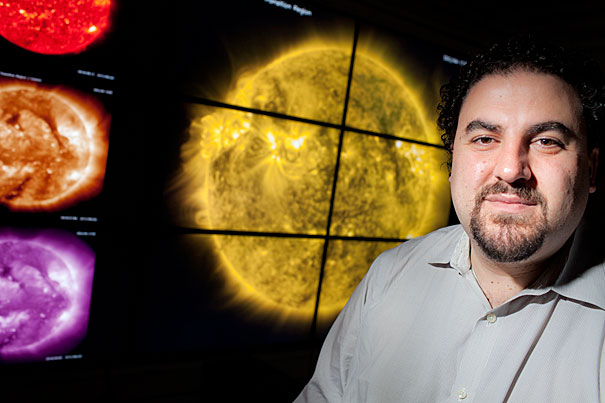Two scientists at the Smithsonian Institution have been honored with the Presidential Early Career Award for Scientists and Engineers for their innovative research and scientific leadership. It is the highest honor bestowed by the U.S. government on science and engineering professionals in the early stages of their independent research careers. The awards were announced Monday, Sept. 26.
Justin Kasper, an astrophysicist at the Smithsonian Astrophysical Observatory in Cambridge, Mass., was recognized for his work with Solar Probe Plus―the first mission to the sun, scheduled for 2018. Kasper’s creation, SWEAP (Solar Wind Electrons Alphas and Protons) is one of the four instrument packages that will be on the spacecraft; it will help scientists learn how the sun’s corona, or atmosphere, is heated and how the solar wind is accelerated to supersonic speeds.
Image right: Justin Kasper, an astrophysicist at the Smithsonian Astrophysical Observatory in Cambridge, Mass., received the with the Presidential Early Career Award for Scientists and Engineers for his work with Solar Probe Plus; the first mission to the sun, scheduled for 2018.
“By flying a spacecraft through the upper atmosphere of the sun we will expose the fundamental physics responsible for the million-degree corona and help understand and forecast space weather,” said Kasper. “I am honored to have received this recognition and encouragement to pursue the mysteries of our sun.”
Pierre Comizzoli, a reproductive physiologist at the Smithsonian Conservation Biology Institute, received the award through a nomination from the National Institutes of Health. It is for his contributions to the field of fertility preservation to save endangered species while generating knowledge that also has relevance to improving human reproductive health. Comizzoli is exploring innovative approaches for drying and using only the DNA of egg cells rather than the far more complex and expensive approach of freezing the entire ovum. This could have enormous efficient and low-cost reproduction applications for many species, including humans.
Image left: Pierre Comizzoli, a reproductive physiologist at the Smithsonian Conservation Biology Institute, received the Presidential Early Career Award for Scientists and Engineers. It was for his contributions to the field of fertility preservation to save endangered species while generating knowledge that also has relevance to improving human reproductive health.
“I am highly honored to receive this Presidential award,” said Comizzoli. “It is a huge recognition for comparative medicine and the development of cutting-edge approaches for preserving and extending the fertility in animals and humans.”






